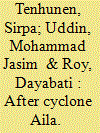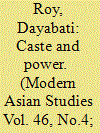| Srl | Item |
| 1 |
ID:
190941


|
|
|
|
|
| Summary/Abstract |
This article compares the politics of climate change in the Sundarbans region in Bangladesh and India based on ethnographic fieldwork in four villages and among migrants from these villages in Kolkata and Khulna city by focusing on the long aftermath of cyclone Aila. The comparison highlights different policy options and framings of extreme weather events . Ten years after the cyclone, the aftermath of Aila continues in both regions we studied in Bangladesh and India, but partly for different reasons. In our study areas in Bangladesh, the aftermath of Aila reinforced the neglect of coastal livelihoods, whereas, in the communities we studied in India, Aila spurred new investments in the affected areas. By comparing how the political is interwoven with the natural, we demonstrate how Aila's lingering impacts have emerged as part of local power relationships and diverse forms of agency. We highlight the multiplicity of policy responses and people's practices not only between communities and countries facing a similar predicament but also within the communities themselves. We argue that the politics of climate change is not only about climate change policy to mitigate the impact of ecological disasters but also about the reconstruction of political agents and practices.
|
|
|
|
|
|
|
|
|
|
|
|
|
|
|
|
| 2 |
ID:
115051


|
|
|
|
|
| Publication |
2012.
|
| Summary/Abstract |
This paper explores the institution of caste and its operation in a micro-level village setting of West Bengal, an Indian state, where state politics at grass roots level is vibrant with functioning local self-government and entrenched political parties. This ethnographic study reveals that caste relations and caste identities have overarching dimensions in the day-to-day politics of the study villages. Though caste almost ceases to operate in relation to strict religious strictures, under economic compulsion the division of labour largely coincides with caste division. In the cultural-ideological field, the concept of caste-hierarchy seems to continue as an influencing factor, even in the operation of leftist politics.
|
|
|
|
|
|
|
|
|
|
|
|
|
|
|
|